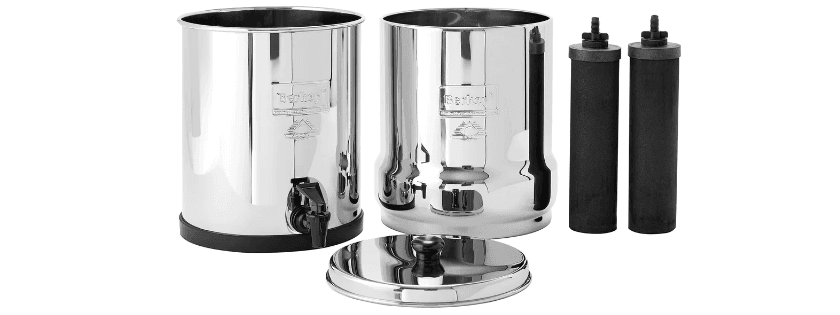Introduction to Eco Friendly Water Filters
Water filters are essential for ensuring safe, clean drinking water by removing contaminants and toxins. However, many traditional water filtration methods can have negative environmental impacts due to energy use, chemical additives, and waste production. Eco friendly water filters offer sustainable alternatives that minimize harm to the environment while maintaining effective purification. These systems use natural materials, energy-efficient designs, and reusable components to provide fresh water responsibly.
Top Eco Friendly Water Filters Reviewed
Big Berkey Water Filters

The Big Berkey Water Filter uses a two-stage process combining gravity filtration and high-quality filter elements that remove over 200 contaminants including viruses, heavy metals, and chemicals. It operates without electricity or chemicals, making it an energy-saving, environmentally sustainable choice suitable for residential use.
Pros:
- No electricity or chemicals required, reducing environmental footprint
- Removes a wide spectrum of contaminants including lead, mercury, and viruses
- Durable filters last up to 3 years with proper care, reducing waste
Cons:
- Higher upfront cost compared to basic filters, though cost-effective over time
- Limited capacity may not meet large volume needs for big households or businesses
Aquasana Whole House Water Filter

This whole house system filters water at the point of entry, removing up to 99% of chlorine, heavy metals, pharmaceuticals, and sediment. It softens water using mineralized media, protecting appliances and improving water quality house-wide. Its eco-conscious design helps reduce chemical exposure and water waste.
Pros:
- Filters out chlorine, sediments, pharmaceuticals, and heavy metals
- Extends appliance lifespan by softening hard minerals
- Reduces reliance on bottled water, lowering plastic waste
Cons:
- Installation and filter replacement can be pricey for large households
- Requires regular maintenance and filter changes for optimal performance
Propur ProMax Water Filtration System
The Propur ProMax combines carbon block and granular activated carbon (GAC) filters made from sustainable coconut shells, capturing up to 99% of contaminants including chlorine, herbicides, pesticides, heavy metals, and cysts. It’s easy to install, requires no electricity or plumbing, and offers reusable cartridges reducing waste.
Pros:
- Constructed from sustainable materials like coconut shells, minimizing environmental impact
- Highly effective two-stage filtration removes a wide range of contaminants
- Low maintenance with reusable cartridges and tool-free installation
Cons:
- Cartridges require replacement every 4 months, adding ongoing costs
- Limited flow rate makes it less suitable for large households
EcoSmarte Home Water Purification Systems
EcoSmarte offers a variety of purification technologies including reverse osmosis and UV light disinfection, prioritizing energy efficiency and natural filtration methods. Their compact systems use minimal power and require no chemicals, offering convenient, eco-conscious drinking water purification.
Pros:
- Utilizes natural filtration and UV sterilization to avoid harsh chemicals
- Energy efficient designs consume less electricity than traditional filters
- Compact size with easy installation under sinks or countertops
Cons:
- Higher initial cost with savings realized over time through energy efficiency
- Reliant on electricity, potentially limiting use in areas with unreliable power
iSpring RCC7AK 6-Stage Reverse Osmosis Drinking Filtration System

The iSpring RCC7AK employs a comprehensive six-stage filtration process with reverse osmosis technology, removing up to 99% of contaminants. Despite the advanced filtration, it uses minimal electricity and conserves natural resources, providing an effective, eco-friendly alternative to bottled water.
Pros:
- Advanced 6-stage reverse osmosis filters effectively remove a broad range of impurities
- Energy-efficient operation minimizes environmental impact
- Reduces dependency on single-use plastic bottles
Cons:
- Frequent filter changes needed, contributing to maintenance costs
- Higher initial investment relative to basic filters
What Makes a Water Filter Eco Friendly?
Eco friendly water filters are defined by their sustainable design and operation. Key attributes include:
- Use of natural or renewable materials such as coconut shell carbon or ceramic
- Designed to reduce or eliminate electricity or chemical use
- Reusable or long-lasting filter components to minimize waste
- Efficient filtration processes that conserve water and energy
- Reduction in plastic waste by replacing bottled water consumption
These characteristics ensure the filtration system delivers clean water while protecting the planet’s resources.
Environmental Impact of Non-Eco Friendly Filters
Traditional water filters often rely on chemical treatments and energy-intensive processes. This can lead to:
- Increased energy consumption contributing to greenhouse gas emissions
- Release of toxic substances into water sources and ecosystems
- Generation of plastic and filter waste placing strain on landfills
- Frequent replacement parts increasing environmental footprint and cost
- Health risks from chemical by-products affecting humans and wildlife
In contrast, eco-friendly water filters mitigate these harmful effects through thoughtful design and material choices.
Why Invest in an Eco Friendly Water Filter?
Choosing an eco friendly water filter offers multiple benefits beyond clean water:
- Sustainability: Reduces your household or business environmental footprint by saving energy, water, and reducing waste.
- Cost Savings: Although upfront costs may be higher, long-term savings come from lower maintenance, less bottled water purchase, and energy efficiency.
- Health Benefits: Provides safer drinking water free from chemicals and contaminants that can affect wellbeing.
- Convenience and Durability: Many models require less maintenance and have longer filter lifespans.
- Environmental Responsibility: Supports conservation efforts by reducing plastic pollution and toxic chemical usage.
Investing in such a system supports a healthier lifestyle, cleaner environment, and smarter resource use.
Conclusion
Modern eco friendly water filters offer effective, sustainable solutions to water purification challenges. By understanding the features, pros, and cons of top models like Big Berkey, Aquasana, Propur ProMax, EcoSmarte, and iSpring, consumers can make informed choices that suit their needs and values. Prioritizing eco-friendly filtration is a vital step towards a greener future, protecting your health and the planet.
